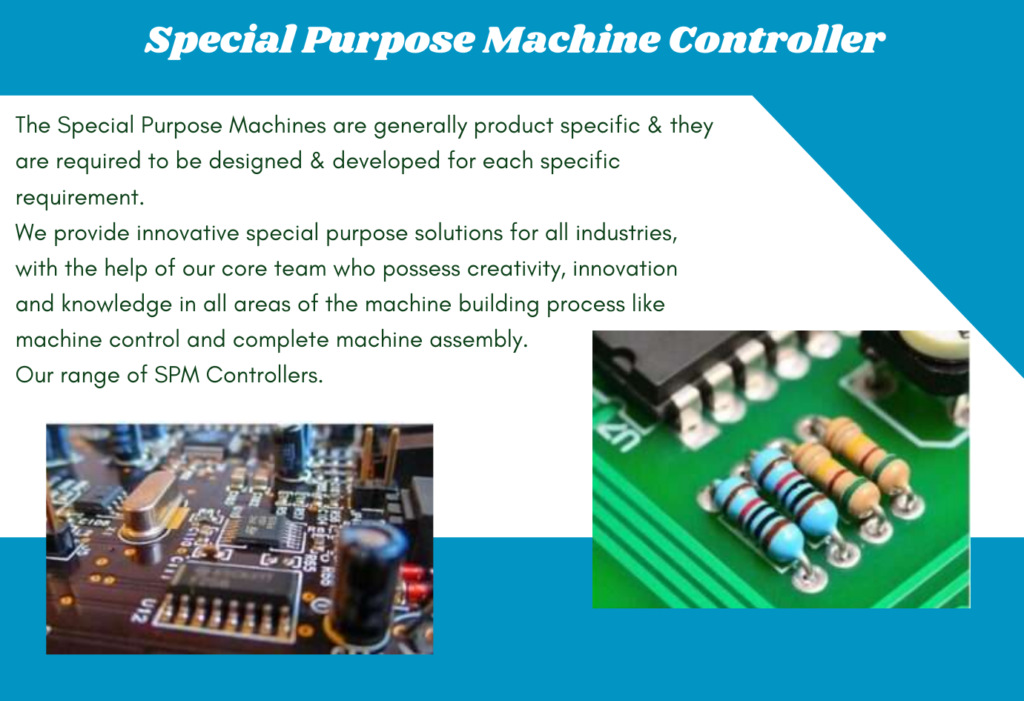In the dynamic world of manufacturing, efficiency is the name of the game. Companies strive to produce high-quality products at the lowest possible cost, all while meeting ever-increasing customer demands. To achieve this, manufacturers turn to various technologies and tools, and one such tool that has gained significant prominence in recent years is the Special Purpose Machine Controller (SPMC). In this blog, we’ll delve into the profound impact of SPMC systems on manufacturing efficiency.

The Rise of Special Purpose Machine Controllers
Special Purpose Machine Controllers are at the heart of advanced manufacturing processes. These controllers have evolved significantly from their early iterations, which were primarily used for simple and repetitive tasks. Today, SPMCs are highly sophisticated, computer-based control systems designed to manage complex machinery and automated processes with precision.
1. Precision and Consistency
One of the primary advantages of SPMCs is their ability to deliver unparalleled precision and consistency. These controllers can perform repetitive tasks with near-perfect accuracy, reducing the likelihood of errors and defects in the manufacturing process. In industries where high precision is crucial, such as aerospace and medical device manufacturing, SPMCs play a critical role in ensuring the quality and reliability of products.
2. Automation and Labor Savings
Automation is a key driver of manufacturing efficiency, and SPMCs are at the forefront of this transformation. By automating various manufacturing tasks, SPMCs reduce the reliance on manual labor, leading to substantial cost savings. This not only cuts down on labor costs but also minimizes the risk of human error, enhancing overall product quality.
3. Faster Production Cycles
SPMCs are designed to work at high speeds and with incredible efficiency. They can process tasks at rates that far exceed human capabilities, leading to shorter production cycles. This increased throughput not only allows for more products to be manufactured in a given timeframe but also enables manufacturers to respond quickly to changes in demand, ultimately enhancing the adaptability and responsiveness of their operations.
4. Customization and Flexibility
Modern manufacturing is characterized by the need for product customization. Consumers increasingly demand products that are tailored to their specific needs, and this is where SPMCs shine. These controllers can be easily reprogrammed to adapt to different product specifications, making them incredibly flexible tools for manufacturers. This flexibility allows for rapid retooling and setup changes, reducing downtime and enabling the production of a wide range of products.
5. Data Insights and Continuous Improvement
SPMCs are not just about automation; they also generate a wealth of data that manufacturers can use to drive continuous improvement. By collecting and analyzing data on machine performance, manufacturers can identify areas for optimization, minimize downtime, and enhance overall efficiency. This data-driven approach is instrumental in achieving leaner, more efficient operations.
6. Reduced Energy Consumption
Efficiency in manufacturing extends beyond just labor and time; it also includes energy consumption. SPMCs can optimize energy use by ensuring that machinery operates at the highest level of efficiency. This not only reduces operational costs but also aligns with sustainability goals and environmental considerations.
7. Enhanced Safety
Safety is a paramount concern in manufacturing, and SPMCs contribute to safer work environments. By automating potentially hazardous tasks, these controllers minimize the risk of workplace accidents and injuries. They can also incorporate safety features that respond to unforeseen events, further safeguarding both equipment and personnel.
Conclusion
In the fast-paced world of manufacturing, the role of Special Purpose Machine Controllers cannot be overstated. These advanced control systems have redefined the landscape of modern manufacturing, making it more efficient, cost-effective, and responsive to customer demands. By providing precision, automation, flexibility, and data-driven insights, SPMCs have become indispensable tools for manufacturers looking to stay competitive in an ever-evolving market. As manufacturing continues to evolve, the impact of SPMCs on efficiency will only become more pronounced, shaping the future of industrial production.
